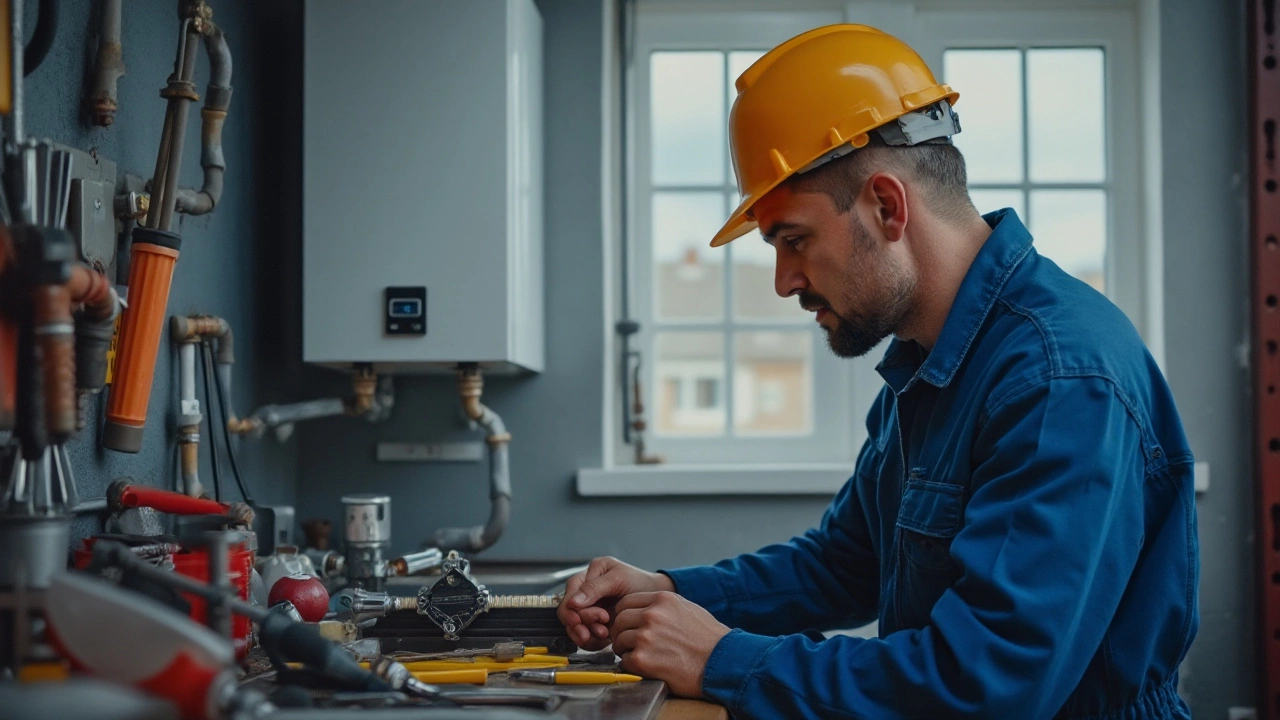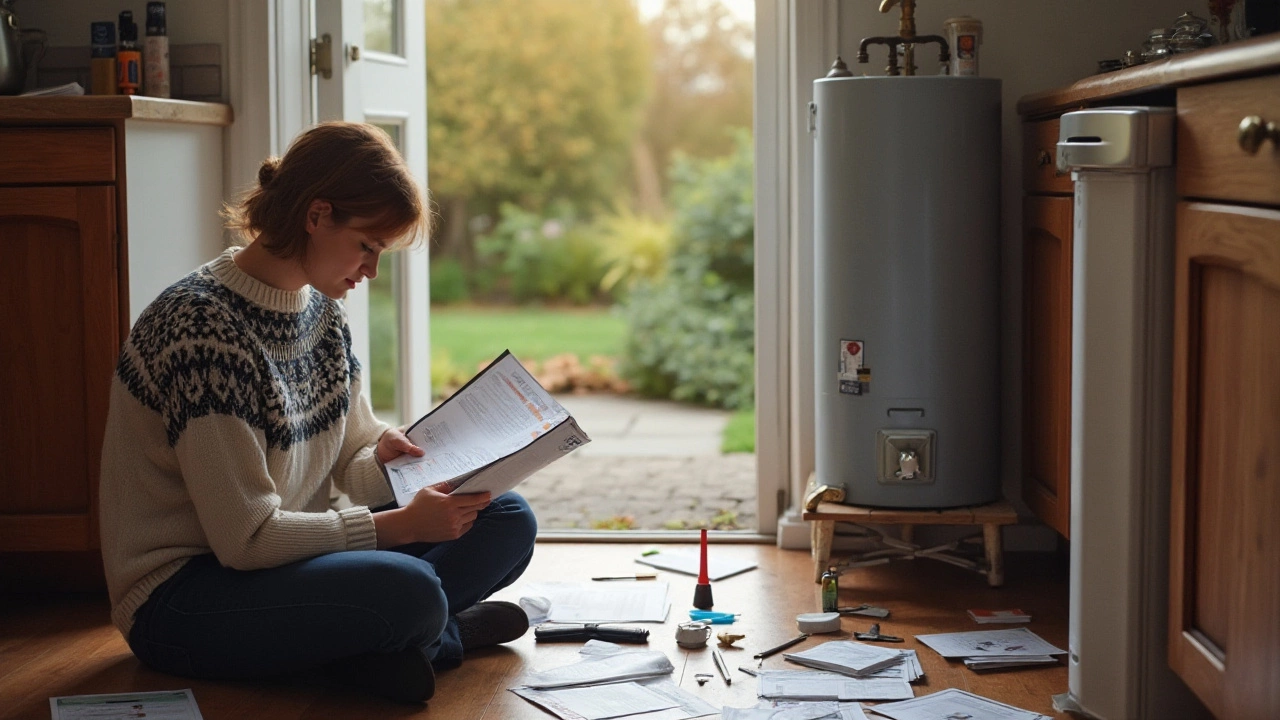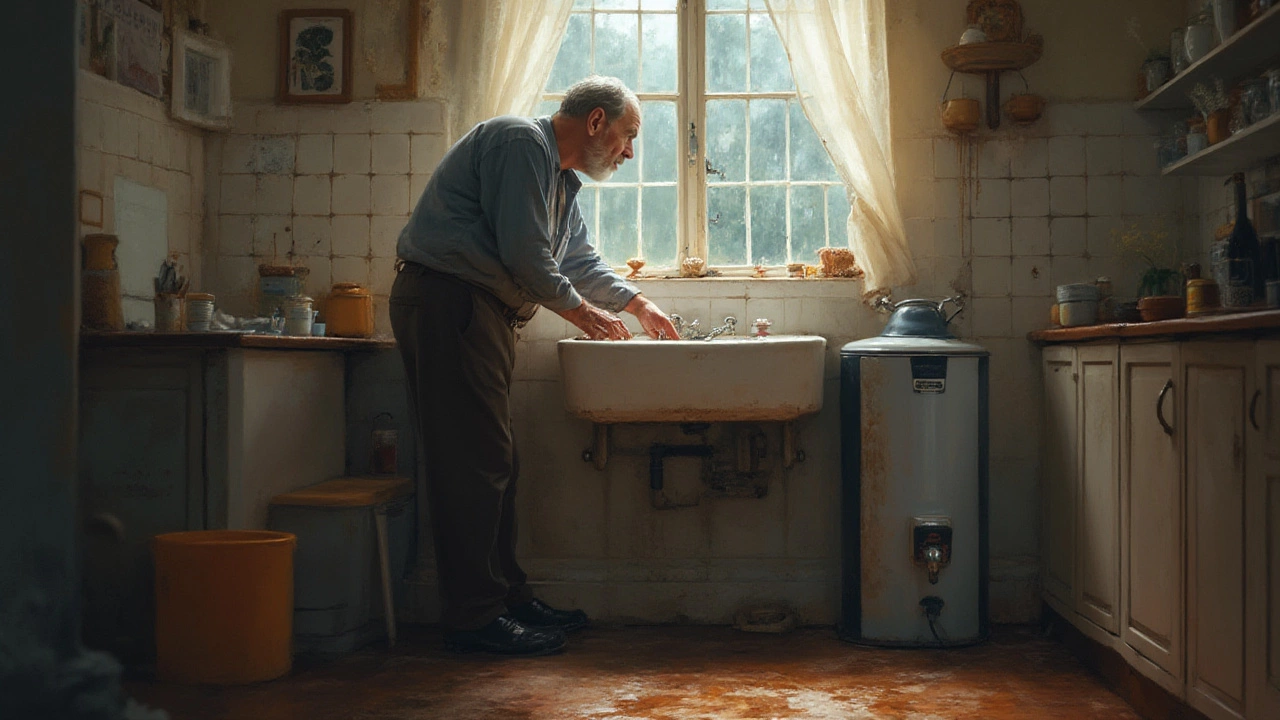
- 28 Nov 2024
- Gideon Thornton
- 0
Fixing a hot water heater doesn't need to be a daunting task, though the required time can differ based on the root of the issue. The goal is to diagnose the problem swiftly so that the right steps can be taken to get back to enjoying hot water without a lengthy delay.
Your water heater could be facing a range of issues, from a minor pressure problem to a more serious mechanical fault. In this article, we'll walk through common problems, how long you might expect repairs to take, and when it might be best to seek professional help to avoid long-term issues.
- Identifying Common Problems
- Estimated Repair Times
- Tips for Efficient Repairs
- When to Call a Professional
Identifying Common Problems
Before diving into fixing a hot water heater, pinpointing what exactly might be wrong is crucial. The first sign of trouble often comes in the form of either no hot water or inconsistent water temperatures. An electric water heater not heating may simply be due to a tripped breaker, and resetting this could solve the problem in minutes. Other typical issues include faulty thermostats or burned-out heating elements. Each symptom has its own set of diagnostic steps, so it's important to carefully note what the heater is doing—or not doing—as this is your best clue towards a resolution.
Another common issue is strange noises such as popping or rumbling sounds. These noises often indicate sediment buildup at the bottom of the tank. This sediment traps water beneath it, causing it to overheat, boil, and create these noises. Routine flushing of the tank, which might take about an hour, can clear these sediments and restore silent, efficient heating. Think about mineral-laden water like an uninvited guest who refuses to leave your party, making everything a bit uncomfortable if not addressed.
“Regular maintenance can extend the life of your water heater and save considerable costs over time,” says the U.S. Department of Energy.
Leaking is another visible issue, which might stem from valves such as the temperature and pressure relief valve or from connections around the water heater. A leak can be minor, like a bit of dripping by the drain valve, which often only requires tightening, or major, necessitating urgent professional intervention if it's caused by corrosion within the tank wall. Out of precaution, always ensure to turn off power and water supply before attempting to inspect or fix any leaks, as the mixture of electricity and water spells danger.
In some cases, the cause of the issue might be a malfunctioning pilot light in gas heaters, which is either out or won't stay lit. This could be due to a problem with the thermocouple or a blockage in the gas line. Addressing these issues might take anywhere between 30 minutes to a couple of hours, depending on familiarity with the equipment and the exact problem. With gas water heaters, safety takes precedence, so if in doubt, enlisting a professional is always a sound option. Remember, ensuring proper ventilation around a gas unit is critical to safe operation.
Knowing the signs and understanding what they mean can save you not just time but also substantial inconvenience. For instance, in winter, losing hot water can be particularly distressing. By recognizing these signs and acting quickly, the repair process becomes much smoother. Take the time to familiarize yourself with these repair insights; it’s definitely worth the effort in maintaining a serene household routine.

Estimated Repair Times
Repairing a hot water heater is like unraveling a mystery—it all hinges on the nature of the problem at hand. Understanding the issue is key to gauging how long the fix will take. Minor issues, such as adjusting a thermostat, might take as little as 20 to 30 minutes of your time. For more fiddly fixes—let’s say replacing the heating element—you could be looking at anywhere between one to two hours. This isn’t just about having the right tools ready; it’s about knowing how to navigate around potential challenges without causing extra headaches down the road.
The age and type of your hot water heater also play crucial roles. A relatively newer model might yield quicker fixes due to more readily available components and straightforward designs. Older models, however, come with a twist—they might require more delicate handling and time-consuming part replacements. As a rule of thumb, if you’re dealing with an electric water heater, anticipate spending roughly one to two hours on repairs involving the heating elements or the thermostat. Gas heaters, on the other hand, might require extra safety procedures, extending the process by an additional hour.
Keeping your repair arsenal well-stocked with common replacement parts, like gaskets or valves, can shave precious minutes off repair time. In fact, a seasoned plumber once told me that the time spent waiting for parts can sometimes match the time actually fixing the heater.
"The second you know what the issue is, get the necessary parts in hand. It trims down half the wait," says Mark Robson, a veteran in household repairs.Getting the prep work done right is half the battle, and having a bit of foresight saves not just time but possibly another trip to the hardware store.
If an extensive issue comes up, like a leaking tank, brace yourself for a longer journey. Fixing or replacing a tank can consume a considerable 3 to 4 hours, potentially more, depending on the logistical challenges. Also, sometimes a repair isn't the best choice — occasionally, replacement is more cost-effective and less time-consuming in the long run. According to a recent survey, about 35% of homeowners opted to replace their water heater after an unexpected breakdown when the device was over 10 years old.
Avoiding unwelcome surprises requires a clear assessment of your water heater’s condition and deciding whether to power through with DIY fixes or call in the cavalry. If you find yourself in the latter camp, remember that professional repair services often boast the experience and parts inventory to resolve issues in a fraction of the time you might expect.

Tips for Efficient Repairs
Handling repairs for your hot water heater efficiently requires a combination of preparedness, understanding, and sometimes, accepting when professional assistance is needed. Ambitious do-it-yourselfers can tackle many issues if they have the right tools and knowledge. A key step is ensuring safety by cutting off power and water supply to the heater before starting any repair work. Working with live electricity or pressurized water is inherently risky and best avoided at all costs. Remember, careful diagnosis is critical; jumping to conclusions without investigating can lead to unnecessary delays and costs.
Time management is another essential aspect. When embarking on a repair, budgeting your time wisely can reduce downtime without hot water. It may help to have a checklist of common issues and the typical time each repair might take, from flipping a tripped circuit breaker, which may only take a few minutes, to replacing a faulty heating element, potentially requiring a few hours. If you need to procure parts, planning ahead by checking local stores' availability or ordering online can save additional waiting time.
Having the right tools on hand can't be overstressed. Essential tools often include a multimeter to check electrical connections, a pipe wrench, and a screwdriver set. You may need a specialized anode rod removal tool depending on the specific repair. Inadequate tools not only lengthen the job time but could potentially cause damage to your water heater. Equipping yourself beforehand arguably stands as one of the most efficient strategies for ensuring smooth repair processes.
Regular maintenance plays its part by reducing the likelihood of major breakdowns. Flushing out sediment buildup every six months can drastically improve your heater's efficiency and lifespan. It's essential to replace worn anodes to prevent corrosion inside the tank, and keeping an eye on the thermostat’s condition can prevent significant issues from cropping up. As Adel Dirks, a renowned plumbing expert notes, "Regular check-ups tend to save homeowners from the costlier woes of unexpected repairs."
"An ounce of prevention is worth a pound of cure," says Adel Dirks, a renowned plumbing expert, describing the critical value of regular maintenance.
While DIY can be rewarding, it's also worth noting that there are times when professional help is the best route. Understanding when a problem is beyond your skills is crucial. For instance, leaks from the tank or persistent electrical trips often indicate deeper issues that can be better handled by an experienced technician. Making hasty repairs without due knowledge can lead to repetitive problems or even void warranties. When in doubt, a licensed plumber will ensure that the repair is thorough, timely, and compliant with the necessary safety standards.

When to Call a Professional
Hot water heaters are complex appliances, and while fixing minor issues might be within the realm of a DIY enthusiast, there are situations where calling a professional is far more prudent. Attempting repairs that are beyond your expertise isn't just risky; it might also void your warranty, leaving you in a difficult spot if additional issues arise. Professionals bring a wealth of knowledge and specialized tools to each service call, ensuring your heater is fixed correctly and safely. Know that issues like significant leakage, repeated breaker trips, or strange noises could be indicators that need expert attention.
Sometimes, the symptoms of a malfunctioning heater can appear deceptively minor but mask larger systemic problems. For example, if your hot water is running out faster than it should, this could be evidence of a failing heating element or a thermostat malfunction. In any instance where an electrical component needs assessment or replacement, a skilled technician should step in. They can efficiently diagnose the problem without guesswork, ensuring that the repair is not just a temporary fix, but a solution that extends the lifespan of your appliance.
Another critical moment to consider calling in help is during planning for system upgrades. Modern heaters require careful installation to meet local codes and maximize efficiency. Many professionals offer valuable advice during the selection process, assisting you in choosing models that align with your home's needs and budget. Oftentimes, this expertise can result in significant energy savings over the life of the unit, a fact to consider when weighing the cost of professional installation.
"A water heater installation or major repair is more than just a task; it's an opportunity to enhance your home's functionality," advises water heater researcher John Marcus. "Professionals can pinpoint solutions specific to your situation, often saving money and time long-term."
If maintenance is becoming more frequent without resolving your heater issues, this indicates that a deeper problem could be at play. Faulty gas lines or persistent sediment buildup are examples of issues where professional input is critical. While you might flush out sediment independently, a technician can assess the root cause and see if a more substantial cleaning or anode rod replacement is necessary.
Lastly, having a regular maintenance schedule with a trusted provider can preempt future emergencies. A documented history allows professionals to track your unit’s performance over time, catching potential issues before they turn into costly breakdowns. Proactivity is key in ensuring your hot water heater operates efficiently, keeping those warm showers consistent and your peace of mind intact.




